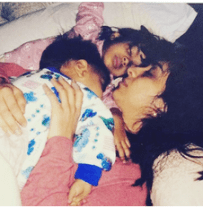Postpartum Depression & Anxiety Amongst South-Asian Women: Addressing and Erasing the Stigma
Postpartum Depression & Anxiety, also known as Postpartum Mood and Anxiety Disorders (PMADs), can affect up to 1 in 7 women. It does not matter if it is your first child or third child, it doesn’t matter your age, your race, your culture or your socio-economic status, postpartum depression can affect any mother.
While there are many risk factors for developing postpartum depression or anxiety, symptoms during pregnancy are the biggest risk factor for developing similar symptoms after the baby’s arrival.
We know that it affects over 25% of mothers.
We know that it does not just magically go away when the baby turns one.
We know that it makes moms feel guilty because they feel like they are doing something wrong.
We know that many moms feel guilt or fear about taking medications what will help them.
We know that many moms are too afraid to tell anyone because they feel that it makes them a ‘bad mom.’
While the awareness of postpartum depression has increased with actresses and sports stars talking about their own struggles after having a baby, there are large sub-groups of women that still struggle, that still hide their feelings, that still feel shame.
Whether it is during my lectures at various conferences or speaking directly with mothers in my pediatric practice, I have noticed the differences, the variations of how various cultural groups address postpartum mental health issues.
While many in our community feel that postpartum depression and anxiety amongst Indian/South-Asian Women isn’t really ‘a problem,’ based on both, my personal and professional experiences, I disagree. A major reason that postpartum mood disorders are not reported nor discussed is because of the stigma of mental health within the South Asian community.
Studies show that for women in India, postpartum depression often goes unrecognized. Factors such as gender of the baby, low income, domestic violence, lack of support from the husband and other adverse life events are all risk factors of developing postpartum depression in this group of women. Unfortunately, the value of having a male baby is still very prominent amongst Indian families, whether it is in India, Europe or even the United States.
Women in India may have more support due to a joint family system to help care for the child while mom is to solely rest and breastfeed during this period of confinement, however, this may minimize or mask the symptoms of postpartum mood disorders. In fact, one study showed that the joint family system is not a protective factor in terms of postpartum mental health symptoms.
Another study from the United Kingdom showed that Indian mothers suffering from PPD often perceive their symptoms as minor, natural consequences of childbirth and as a result, were less likely to contact their physician. Studies have shown that up to 50% of Indian women will never be diagnosed and will suffer in silence. This lack of recognition leads mothers to feel inadequate and isolated. The feelings of isolation can exacerbate depressive symptoms.
I have mothers of South Asian descent in my practice who cry in my office, asking me to help them—whether they feel alone within their joint family system, minimal support from their husband when it comes to parenting or just a general sense of isolation, all of these women, every single one of them is trusting me with a secret, their sense of shame. They not only feel they are a bad mother, but a bad wife, daughter and daughter-in-law.
The cultural stigma of depression is already so taboo in our culture, but when you had postpartum to it, the stigma deepens. Just like for women from all over the world, motherhood is sacred, an honour, a time that is to be cherished and enjoyed. How can a woman not enjoy being a mother? Mothers are often told “This will be the happiest time of your life.” So how do we expect a woman, a mother to ask for help when the rest of society tells her she’s wrong to feel what she is feeling?
While physicians, both pediatricians and obstetricians, screen for mood disorders during pregnancy and in the postpartum period in the United States, this is not the case amongst physicians in India/South Asia. If physicians don’t ask women, then they will never know. And while symptoms may start during pregnancy and persist after the baby’s birth, there are many other risk factors for untreated postpartum depression and anxiety.
Mothers who suffer from untreated postpartum mood disorders are less likely to bond with their child, may have increased difficulty with breastfeeding, poor sleep and may develop postpartum depression or anxiety with future pregnancies.
As a community, we, all of us, have to change this so mothers can get the help they need. This includes the physicians and nurses who care for mothers and babies, but also the family and the community. The husband, the mother, the mother-in-law, the extended family—they ALL need to be part of the solution in order to effect change. This is not a deficiency in her as a woman, a mother—any of us can suffer from postpartum depression. Instead of burying our heads in the sand or vilifying the mother, the entire South Asian community needs to acknowledge it and address it—only then can we effect change.
Mothers are the crux of our communities—they give birth, they nurture, they raise children to become kind, caring and successful members of the human race. But as much as we focus on the baby after delivery, we also need to give that amount of focus, if not more, on the mother. My mantra: Happy Healthy Mom Equals Happy Healthy Baby.

